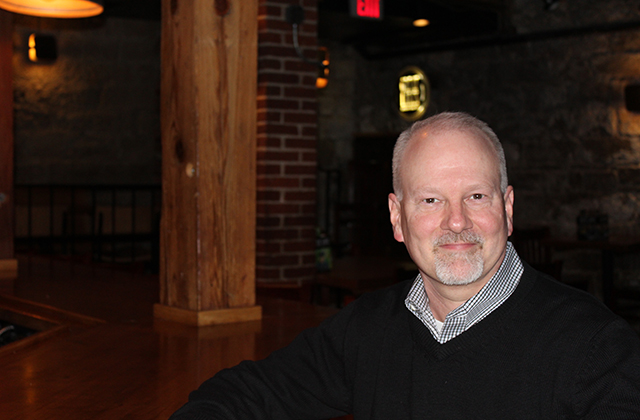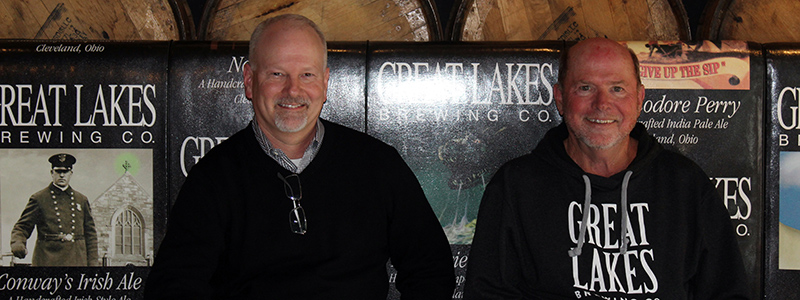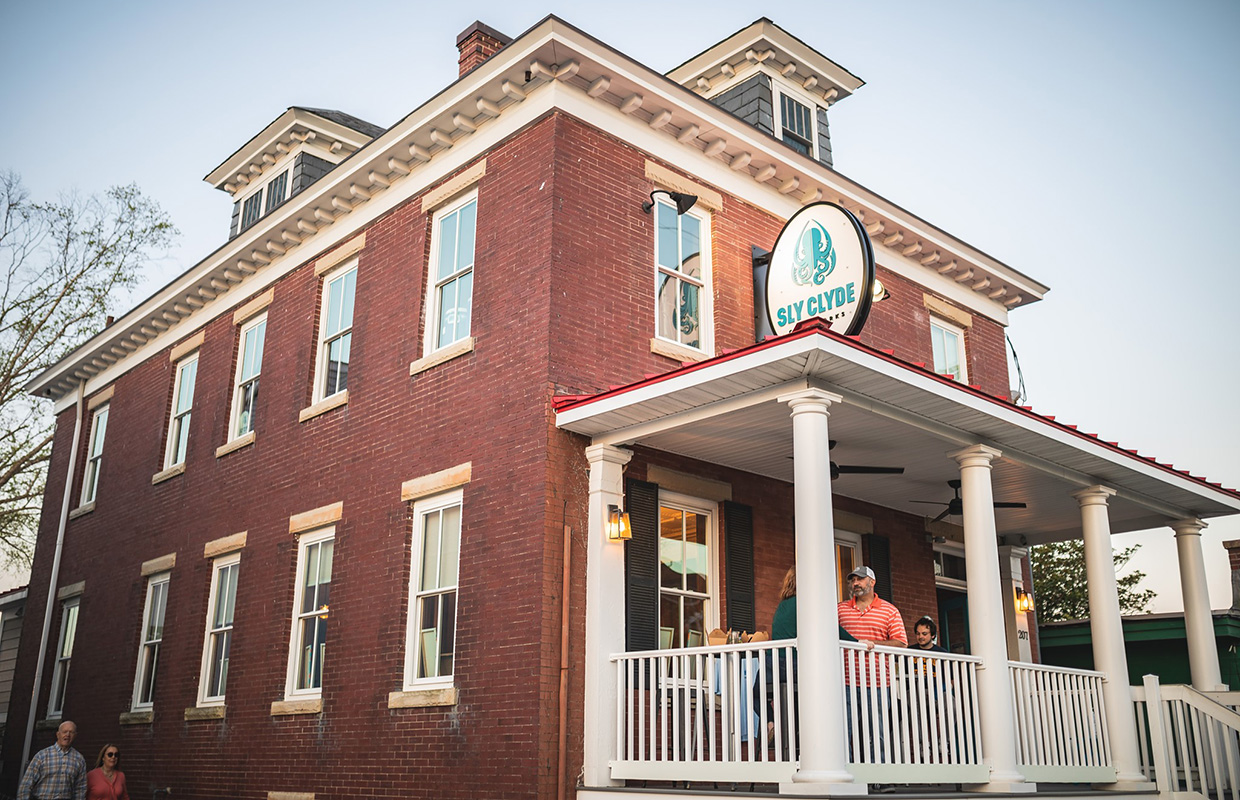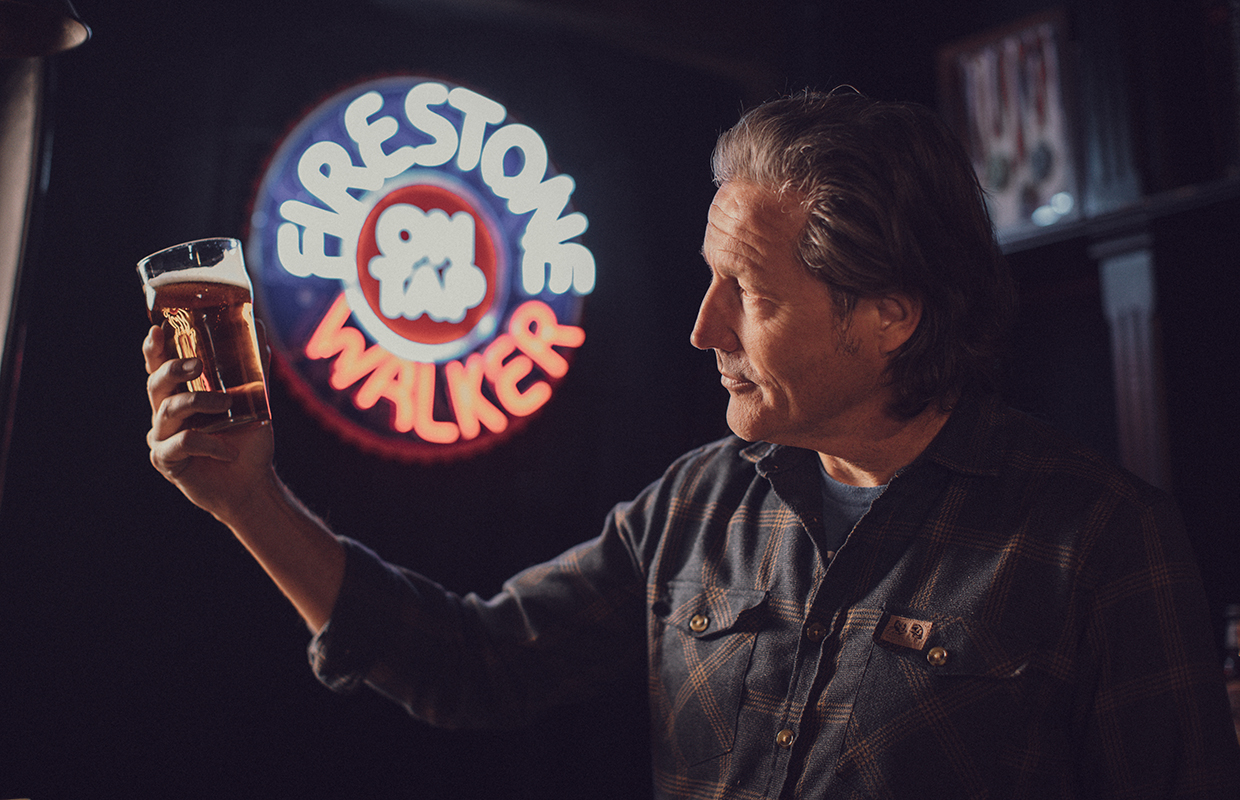
As the craft beer industry matures, so does its need for strong business knowledge while keeping a brewery’s culture in place. That especially rings true for a brewery like Great Lakes Brewing, which opened as a brewpub in 1988 and is on the cusp of hitting its third decade of existence.
Owners and founders Dan and Patrick Conway saw a future need for strategic planning, especially in the area of capacity issues, and planned for it by going outside of craft beer to find their first CEO.
It just so happened that Bill Boor, an executive Vice President for Cliffs Natural Resources, a mining company based in Cleveland, was nearing his 50th birthday in late 2015 and looking for a change in his day-to-day work schedule.
“I was passionately watching the craft industry, but I guess I separated the two from work and a hobby,” Boor said, “and that wasn’t smart of me.”
He was set up for a meeting with the Conways through a mutual acquaintance. After a few hours, and a few pints at the brewpub, the trio decided that this was a path worth pursuing.
Boor admits it’s an interesting management challenge.
“I have been in places that are very process oriented and as a result of that I have a good background making those decisions and how to manage them,” he said. “But at the same time, the challenge for me, and I’m excited for it, is we don’t apply those processes in a context like this. This industry is different, this organization is different and to an extent I’m here because of the culture and I love it. I’m here to figure out the strategy and not breaking what is so great about this place.”
Boor comes in humble, knowing that what worked for profit-driven, publicly traded companies won’t translate completely to a company that has what he and the Conways like to call the “triple bottom line” of social, environmental and fiscal sustainability.
“I recognize that I would be doing a great disservice if I came in here and said I knew how to do it all because I would reapply processes from other places into this company,” Boor explained. “That’s not my mentality. I was pretty eyes open coming here.”
Boor shared the story that soon after he started, he was down in the pub talking to a regular over a beer. The patron introduced Boor to another gentleman.
“The guy shook my hand and he held my hand too long,” Boor said with a laugh. “He pulled me in and he said don’t screw this up. That’s how I have approached it. There is so much magic here and my first job is to do no harm and second is to bring my experience to the situation.”
Boor said he has thought through all the aspects of what business philosophies he has learned from the age of 22 to 49 when he was in the business sector to see what translated and what didn’t.
“That’s my job, not to bring wisdom I have from other industry, but to look at a different situation and say ‘here is what fits and here is what doesn’t,’” he said. “I’m not looking to make Great Lakes a process-bound efficiency monster. Because that’s not what we are. I know that’s in my background, but it’s not the craft industry.”
The elements of business are the same, but it’s so different where to push and where to be patient, he noted.
“Some people learn a way of doing things and they steep themselves in that and they apply it to different situations,” Boor explained. “Maybe it’s in my nature to learn from comparing and contrasting things. That’s what excited me as as a manager and a leader. I was very conscious of how different the culture is here compared to where I have been before, then you are sensitive to it and you manage accordingly.”
That has been a focus since for Boor being named CEO of Great Lakes — making sure he doesn’t mess with the culture, not creating something new. He even pointed out that Great Lakes, the 21st largest craft brewery in the nation at more than 160,000 barrels a year, didn’t add a CEO to fix something that was broken.

“I wasn’t brought in here to bring disruptive change,” he said. “This is a healthy company with a tremendous culture. They had to ask if I fit. I had to ask that question myself. Being sensitive to managing a culture and finding a way to give a longer-term strategy to it. And in those terms I have had those opportunities in other companies.”
Boor said he has been behind a number of major capital projects, which is something that is on the docket for the brewery. Crammed into what used to be a very run-down part of Cleveland, the Conways helped transform the area through urban renewal. Using the empty buildings just southwest of the downtown area, the Conways built a brewpub in the 80s and eventually a production facility. Now that space is all built up, and although the brewery distributes to just 13 states, future growth could mean further penetration into the swatch of states from North Carolina up into Wisconsin and Minnesota or into new states. A partnership with Harpoon Brewing in April meant that Great Lakes has capabilities to can. Great Lakes just didn’t have the physical space to add a canning line without having to take something out.
“What excites me of being here, and it’s sort of a general statement: I have been in companies where growth is the objective, profitability is the objective and the next quarter has to be what is expected,” he said. “And I’m not even negative about that, that’s where some businesses are in their maturity and need to be. But you come here to Great Lakes, here we have a truly triple bottom line because the owners want the social and environmental standards as important as financial. You can say that, and I don’t know if a lot of people can believe it, but these guys have passed up big dollars to sell because that’s not what this is all about.
“When we talk about growth and whether if we should stay where we are. The reason we even talk like that is because of wanting to get better. If growing is a part of getting better then we will grow. And that is a much different mentality than many other industries.”
The capacity issue is at the forefront of Boor’s mind nowadays.
“I have been on the decision side of that and how to sequence activities leading up to that decision. And it’s complex,” he said. “A big part they were looking for on that decision in skills and experience was they aren’t sure how to make that decision. We aren’t kind of there yet and we have to figure that out and add some more structure to that. And if we do catch that bus, what do we do with it.
“We can’t claim progress until there is a project for us. But I have tried very hard to bring structure and sequence to get us aligned in how we are attacking the decision. That comes from my experience in a disciplined decision making process of large companies that go through that all the time.”
It’s more of shifting ideas, not wholesale changes that Boor is thinking of for Great Lakes. He noted that there are ways to think of operations as more of a way to guide a mindset shift.
“We are capacity limited but you have to think of a manufacturing operation as where the bottleneck is and how you can manage around that,” he said “The people that had grown up here had a certain way of looking at it and I am tweaking it based on my experience. I think I am causing some development in how people think in things like that. But I am learning a lot and I came in knowing I had to listen and learn.”
One of the most difficult things to manage is a system in balance said Boor, which is how well Great Lakes is functioning now.
“It’s easier to manage a constraint,” he said. “Our salespeople are out there with a job to sell. If they do too good, we can’t make it. We have to say ‘Sell but be careful.’ We are in an awkward position where we are right at that limit. We are trying to figure out what that means and continue to work on it.
“We aren’t going to break what we have so the challenge is not how to produce more beer. If that was it, we would rent some space in an industrial park and add a brewhouse and the sales team would go at it. That’s not Great Lakes in this industry. So now we are at the point where we are looking for something that works for us and people will see that works for us.
“Is urban renewal the next move? What are we going to do from an environmental standpoint? What is the impact going to be to the existing organization? We are going to take some of the pressure off the modern production, so what will the impact be on the current folks. Should it be close or should we have more geographic diversity. It’s not just ‘go get X-amount of barrels.’ For some people it’s frustrating, but we want it to be a hand in the glove situation.
“This is a crammed-in, difficult place to operate at in the production level we are at. I’m always surprised how much beer these guys make. It’s tight. We don’t store a lot of material here, the materials go in and out. Industry folks come in and they have the same reaction. And it’s done safely.”
A homebrewer for 23 years, Boor is still gun shy when it comes to sharing his hobby’s creations at his new job. While sitting in the upstairs of the brewpub for the interview with Brewer, brewpub brewer Steve Foreman stops by with a sample from a new creation. The conversation comes to Boor and what he has done lately at home. He said after a short hiatus, he started brewing again in January of 2017.
“Maybe because I could just walk over and talk to the brewers,” he said of the lull in brewing at home. “I made a batch and I don’t want to share it because I don’t want people going around saying ‘The CEO doesn’t know what he is doing,’” he said with a laugh. “But I am getting back into it. It’s a New England over-hopped IPA like Lawson’s Sip to Sunshine. I didn’t hit it exactly.”
The brewpub creation Foreman shares is one of a variety of styles being made in house for local Cleveland drinkers. It’s just as innovative as any other brewery in the country, but Boor admits that even loyal fans of the Great Lakes brand may only think of the brewery as a facility that churns out it’s flagships like Dortmunder Gold Lager or Elliot Ness Vienna Lager and Edmund Fitzgerald Porter.
Boor noted that in February the brewery hosted a Barrel-Aged Blackout Stout and Barrel-Aged Barleywine fest which saw more than 300 people stop by for tastings.
“We can be a victim of our own success,” Boor said during a tour of the facility where a line of wood casks are stacked up in the basement, “we are known for our true classic beers and so that’s how people have us in their head, but we are doing a lot of innovative stuff.”
That innovation will continue to spread as the brewery is installing a two-barrel pilot system right next to its 75-barrel system that runs 24 hours a day. It will be available for any Great Lakes employee to be creative with, which could help lead a new spur of innovation for the brewery.
The knowledge Boor has for business comes from decades of work in the public business sector. A graduate of Penn State with a MBA from Harvard, Boor has worked for Procter and Gamble in Pennsylvania to Weyerhaeuser in Seattle as a VP of Finance and Planning. He eventually ended up in Cleveland a decade ago with Cliffs and worked his way up to Executive VP of Corporate Development.
“This industry has so many people that have the same passion for the craft brewing industry,” Boor said, “and they started breweries when they were younger, I just took a different path.”
Along with his CEO title at Great Lakes, the brewery also hired Bridget Barrett as the VP of Sales and Marketing. She came from Starbucks International as a Senior Brand Manager. So the future of this Cleveland craft beer name has an air of outside business knowledge coming in as a second wave. That can be scary to some in the craft beer world when an “outsider” comes into the realm.
“I think it’s about being complimentary,” Boor said, indicating that the changes made at Great Lakes is probably outside the norm. “There is nothing wrong if there is someone that is the right person in the industry to take it to the next stage of this industry’s development. It’s an industry that continues to mature. There is no reason people that grew up in this industry can’t do that. It’s not imperative to find people in the international mining industry, for instance, to grow your business. That isn’t always going to make sense.
“I think it is good if the fit is there and there are people that are learners and not re-appliers. You can’t force it on the industry, It’s a unique industry and you have to pay homage to the way it’s grown up and the people that have made it successful. We can’t kill the spirit of going from a homebrewer to a small business owner to catching fire and having a big business then I don’t know if people will be as interested in us as much as they are. People have to want to be a part of that and not break that piece.”
Boor said that the Conways are in daily contact still and are a key part of the leadership team for Great Lakes.
“They haven’t thrown me the keys and said ‘we’ll be in Florida.’ We talk almost every single day and many hours a week,” Boor said. “I think that is the biggest risk for something like this is to see how the personal relationships work. The alignment around strategic issues and many owners in their situation may be advised that it’s time to bring in management and start thinking about succession.
“I got very comfortable with them as people. But what you don’t really know that they want to bring a new element in, but do they really. And they really do. I’m not coming in to takeover, they will always be involved here. So that relationship has worked very well.”





1 Trackback / Pingback